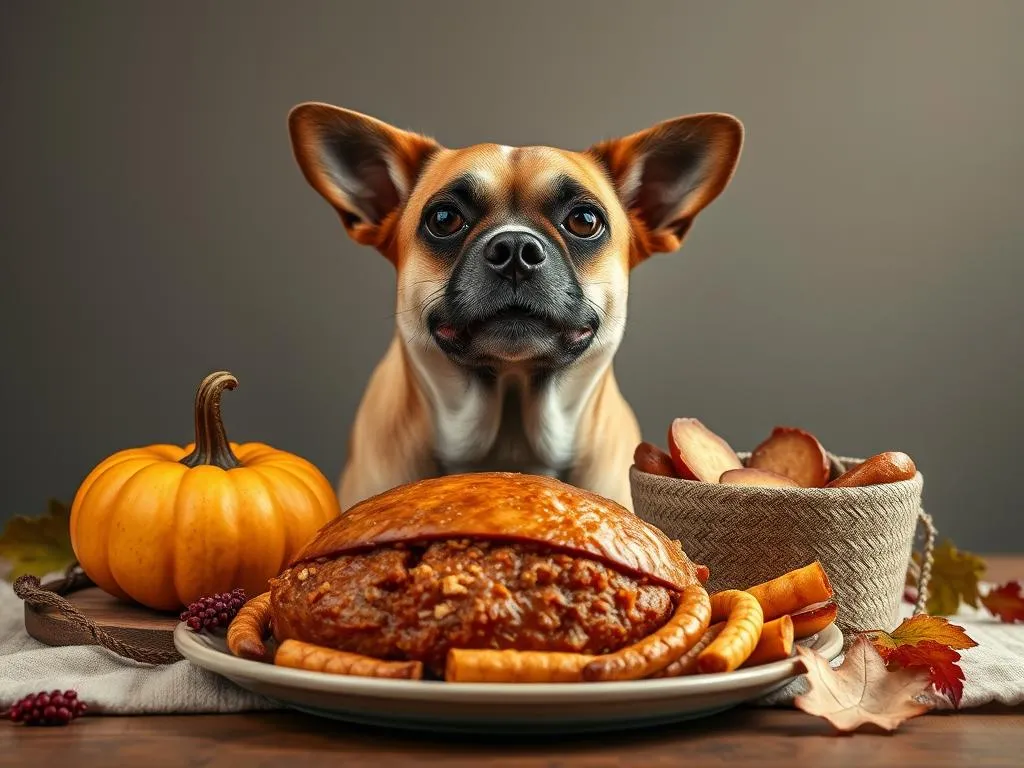
Introduction
Proper dog nutrition is vital for the health and well-being of our furry companions. As the Thanksgiving holiday approaches, many dog owners find themselves sharing their festive meals with their pets. While it’s a heartwarming tradition, not all Thanksgiving food for dogs is safe. This article aims to help dog owners make informed decisions about what foods are appropriate for their dogs during the Thanksgiving celebrations.
The importance of keeping our pets safe cannot be overstated. By understanding which foods can be shared and which should be avoided, you can ensure a joyful and healthy Thanksgiving for everyone in your family, including the four-legged members.
Understanding Dog Nutrition
Basics of Dog Nutrition
To make informed decisions about Thanksgiving food for dogs, it’s essential to understand the basics of dog nutrition. Dogs require a balanced diet that includes:
- Proteins: Vital for growth, repair, and overall health. Sources include meat, fish, and eggs.
- Fats: Provide energy and support cell growth. Healthy fats can be found in fish oil and chicken fat.
- Carbohydrates: Offer energy and aid in digestion. Sources include grains and vegetables.
- Vitamins and Minerals: Necessary for proper metabolic function. These can be found in fruits, vegetables, and supplements.
Each nutrient plays a significant role in maintaining a dog’s health, from strengthening their immune system to promoting healthy skin and a shiny coat.
Common Nutritional Myths
Despite the wealth of information available, several myths about dog nutrition persist. One common misconception is that dogs are strictly carnivores. While they do require protein, dogs can also thrive on a diet that includes vegetables and grains. Understanding these facts can help you create a balanced diet for your dog, especially during festive occasions like Thanksgiving.
Thanksgiving Foods that are Safe for Dogs
As you prepare for the Thanksgiving feast, it’s crucial to know which foods are safe for your canine companion.
Turkey
Turkey is often the star of the Thanksgiving table and can be a great treat for dogs. However, it’s essential to:
- Remove the skin and bones: Turkey skin is high in fat, which can lead to digestive issues for dogs. Bones can splinter and cause choking or serious internal injuries.
- Avoid frying: Fried turkey can contain unhealthy oils and seasonings that are not suitable for dogs.
Plain, cooked turkey meat can be a wonderful source of protein for your pet when prepared correctly.
Vegetables
Many Thanksgiving vegetables are safe and nutritious for dogs. Consider the following options:
- Green beans: Low in calories and high in fiber, they can be served steamed or raw.
- Carrots: A crunchy treat that dogs typically enjoy. They are low in calories and high in vitamins.
- Sweet potatoes: Packed with vitamins and fiber, they should be cooked and served plain.
The preparation of these vegetables is key. Steaming is ideal to preserve nutrients without adding harmful fats or seasonings.
Fruits
Certain fruits can also be included in your dog’s Thanksgiving meal:
- Apples: Remove the seeds and core. Apples are a great source of vitamins A and C.
- Pumpkin: Plain, cooked pumpkin is beneficial for digestion and is rich in fiber.
- Cranberries: Fresh cranberries can be a delightful, tart treat, but consult your vet if you’re unsure about your dog’s tolerance.
These fruits can contribute to a healthy diet while providing a festive touch to your dog’s meal.
Grains
While some dogs thrive on grain-free diets, others can benefit from the inclusion of grains:
- Rice: Plain, cooked rice can be soothing for upset stomachs and easy to digest.
- Oatmeal: A good source of fiber, oatmeal can be served in moderation.
When introducing grains, it’s essential to monitor your dog’s response and adjust portions accordingly.
Thanksgiving Foods to Avoid
Not all foods on the Thanksgiving table are suitable for dogs. Some can be downright dangerous.
Toxic Foods for Dogs
Several common Thanksgiving foods are toxic to dogs, including:
- Chocolate: Contains theobromine, which is highly toxic to dogs.
- Onions and garlic: Can damage red blood cells and lead to anemia.
- Grapes and raisins: Known to cause kidney failure in dogs.
If your dog accidentally consumes any of these items, seek veterinary assistance immediately.
Foods that Can Cause Digestive Issues
In addition to toxic foods, some can cause digestive distress:
- Fatty foods: Rich gravies and fried items can lead to pancreatitis.
- Bones: Cooked bones can splinter and cause blockages or tears in the digestive tract.
- Certain sauces: Many sauces contain ingredients that can upset a dog’s stomach.
Signs of digestive distress include vomiting, diarrhea, and lethargy. If your dog shows any of these symptoms after eating, consult your veterinarian.
Preparing Thanksgiving Meals for Dogs
If you want to include your dog in the Thanksgiving feast, consider preparing special dog-friendly dishes.
Homemade Dog-Friendly Dishes
Creating simple, homemade dishes can be a fun way to include your dog in the festivities. Here are a few ideas:
-
Turkey broth: Simmer turkey bones (without any seasoning) in water to create a flavorful broth. Cool and serve it over your dog’s regular food.
-
Veggie mash: Boil and mash safe vegetables like sweet potatoes and carrots. Avoid adding butter or salt.
-
Dog-safe stuffing: Use plain bread, cooked turkey, and safe vegetables to create a stuffing your dog can enjoy.
These recipes can be easily adjusted from human recipes to ensure they are safe and healthy for your pet.
Portion Control and Serving Suggestions
When it comes to Thanksgiving food for dogs, moderation is key. Recommended serving sizes depend on your dog’s size and breed. A general guideline is:
- Small dogs: 1-2 tablespoons of new food
- Medium dogs: 2-4 tablespoons
- Large dogs: 1/2 cup or more, depending on their size
Always introduce new foods gradually to avoid upsetting their digestive system.
Special Considerations for Dogs with Dietary Restrictions
Many dogs have specific dietary needs that should be considered during the holiday season.
Allergies and Sensitivities
Food allergies are not uncommon in dogs, and some Thanksgiving foods can trigger reactions. Common allergens include:
- Wheat
- Corn
- Certain proteins
To identify food allergies, monitor your dog for symptoms such as itching, gastrointestinal upset, or unusual behavior after consuming new foods.
Senior Dogs and Puppies
Senior dogs may require special dietary considerations during the holidays. They often need diets lower in calories but higher in fiber. On the other hand, puppies have different nutritional needs, requiring more frequent meals and higher protein content for growth.
Consult with your veterinarian to determine the best dietary approach for your senior dog or puppy during Thanksgiving.
Conclusion
As Thanksgiving approaches, it’s essential to prioritize the health and safety of your dog. Understanding which Thanksgiving food for dogs is safe and which should be avoided can help you create a joyful celebration without compromising your pet’s well-being.
By being responsible and informed about sharing holiday meals, you can ensure a happy Thanksgiving for everyone in your family, including your beloved canine companion.
FAQs
Can dogs eat turkey skin?
No, turkey skin is high in fat and can cause digestive problems in dogs. It’s best to stick to plain, cooked turkey meat without skin or bones.
Is cranberry sauce safe for dogs?
Cranberry sauce can be safe if it is prepared without added sugars or artificial sweeteners. However, always consult your vet if you’re unsure.
What if my dog eats something toxic?
If your dog consumes a toxic food item, seek veterinary care immediately. Prompt action can be critical in preventing serious health issues.
How can I introduce new foods to my dog’s diet?
Introduce new foods gradually, starting with small amounts to monitor for any adverse reactions. Always ensure that the foods are safe and appropriate for your dog’s dietary needs.
By following these guidelines, you can enjoy a Thanksgiving feast while keeping your dog healthy and safe.









